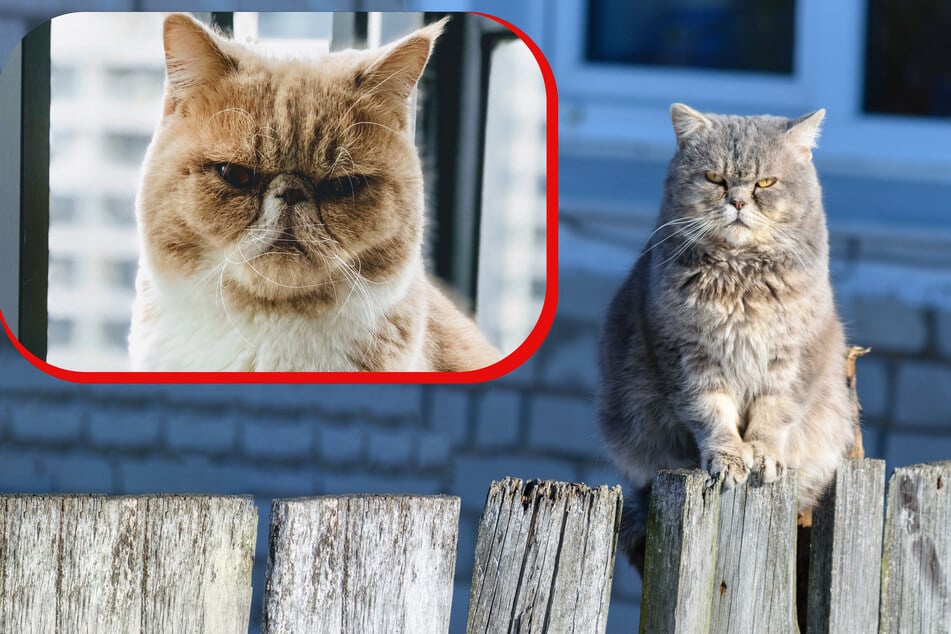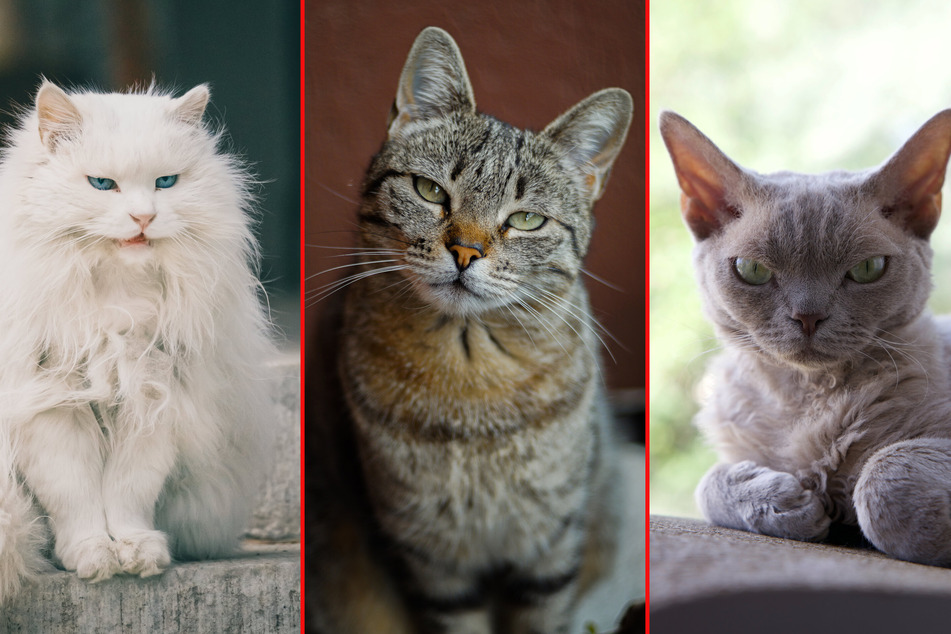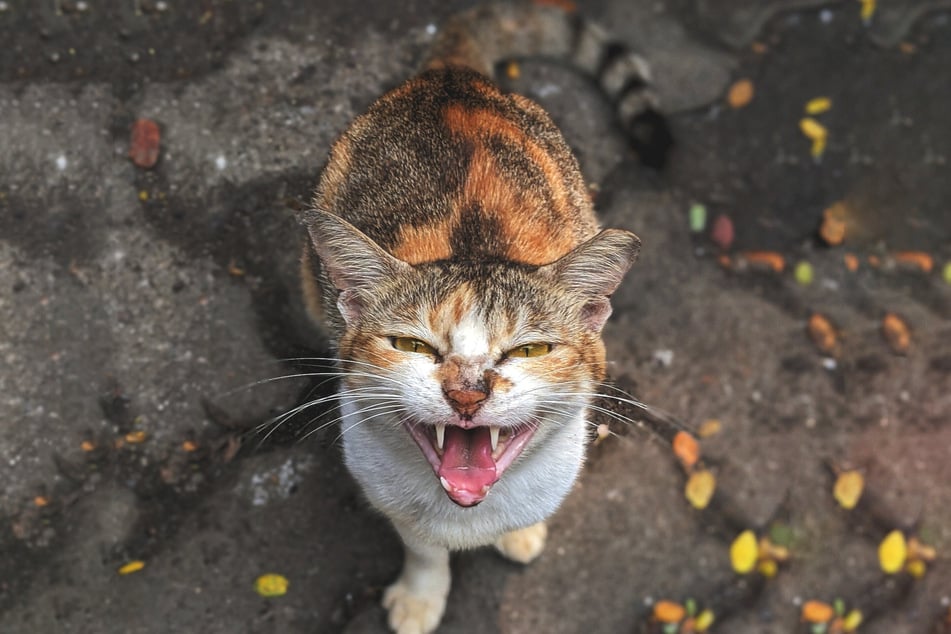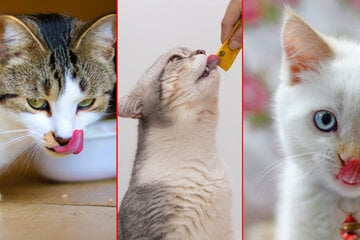Is my cat mad at me? How to tell if your cat is angry or upset with you
Why do cats get annoyed so easily? What causes their tail to flick, their ears to swivel, and their face to scowl? Is your cat mad at you? Here's how to tell.

Have you ever noticed a scowling face on your grumpy-as-gramps kitty?
Have you ever seen it swishing its tail and flicking its ears? Has it ever turned around and hissed, or perhaps given you a swat when your prodding got to be just a little too much?
Unsurprisingly, your cat is probably angry with you, as cats are known to be a bit temperamental.
In this cat guide, TAG24 takes a look at how to tell if your cat is angry or upset with you. We'll go through a variety of cat body language, and common causes of annoyance, to help you solve that age-old question: "Is my cat mad at me?"
Why is my cat mad at me?
Cats can get angry pretty easily, and will often direct that anger or frustration towards their humans. These behavioral issues are not necessarily because of actions taken by you or your fellow human housemates, but can also be caused by environmental issues, other cats or pets, and even sickness.
What are the most common causes of anger in cats?
Territorial disputes: Cats are extremely territorial animals and will always try to protect their homes from intruders, whether they are cats, dogs, humans, or other animals. If another cat (or another animal) has suddenly taken over parts of your kitty's territory, your cuddly companion may get angry, jealous, and anxious, and will likely lash out.
Health issues and pain: If your cat has developed an illness or is in some kind of chronic pain, it will not understand what is happening to it. As a result, it is likely to blame its humans and become increasingly angry and frustrated. In response, it might start to lash out in anger.
Environmental changes: Have you recently moved? Have you recently made major changes to your home, perhaps renovations or purchased a set of completely new furniture? It is very possible that this has disturbed your cat's peace and feeling of safety, leading to increased aggression.
Personality issues: It's also possible that your cat simply has a personality issue. Some kitties are just angry little balls of fluff and can get rather aggressive. They are likely to mellow out as they get older, but it might be a good idea to get the advice of a professional.
Humans can be annoying: Let's be real, we're all kind-of irritating, aren't we? Our cats also feel the same way. Perhaps you've been poking your kitty, perhaps you haven't fed it at a time deemed suitable, or perhaps it just wants pats at an inopportune time? Whatever the reason, you may have irritated your cat, and it may be lashing out because of that.
Boredom or being stuck inside: Have you suddenly changed your habits? Are you not home as often as you were before? Was your cat formerly an outside cat but now is being forced to stay indoors? No matter the reason behind it, boredom is a major cause of aggression and anger in cats.
Warning: If your cat has always been an absolute angel, yet has suddenly decided to treat you like a human scratching rack, it might be time for a trip to the veterinarian. Unless some sort of trauma has befallen them, this is a very clear sign of illness or pain.
Angry cats can get dangerous - so beware!
Slash, swat, flick, twist: angry cats can cause some real harm to humans and other animals.
If you have a particularly dangerous kitty, it might be best to go to your vet and get some advice. The problem is that while a scratch or a bite every now and again will do you no long-term harm, if it becomes a chronic thing, bigger issues can arise – for you and your cat.
If your cat is an outside cat, it can get all sorts of parasites and viruses on its paws and claws, which can then infect wounds and cause serious harm. Overly aggressive and violent cats are not a laughing matter, and need to be treated with care. Get professional advice if this bad behavior becomes constant, as something likely needs to be done.
Be cautious: If you have a family, especially one with young kids, a violent and aggressive cat is a big no-no. In the case that there are no solutions to the problem, it may be time to find your kitty another home.
Why do cats look angry?
Some cats just have casually grumpy-looking faces. They are naturally judgmental-looking creatures, and will seem to peer at you with a great deal of morose distaste from time to time.
Case in point: the viral sensation Grumpy Cat.
That look of utter disgust will be something that you'll get used to if you're a prospective cat owner. It's like that famous adage (well, internet meme): Dogs think their humans are gods, cats think that they are their human's god.
There's also, of course, the facial features of a cat. While doggos have nice wide smiles with big friendly-looking tongues, cats have a perpetually unamused expression on their faces, and eyes that seem to pierce the soul.

How to recognize a mad cat: Angry cat body language
It's pretty obvious when cats get a little irritated, as their big wide eyes and giant ears are rather noticeable when they flicker with anger. That's not to mention the "death stares!" These fluffy little balls would make absolutely terrible poker players, as their emotions are painted right across their faces.
So, what are some of the signs of an angry cat? What body language can we look out for when trying to determine whether it's safe to give your beloved feline friend a nice, gentle pat? What are the features that make angry cats so easy to spot?
Body language of an angry cat:
Waving tail: If your cat's tail is waving ominously, or flicking suddenly from side to side, it is starting to get irritated, and it's probably best to steer clear and avoid petting. In the case that its tail has gone completely stiff, it is truly enraged – and this is when you must move away as quickly as possible.
Flicking ears: Cats will flick their ears at you when they don't quite want you to continue petting or interacting with them. This includes flicking as a response to annoying or unpleasant noises. If they get truly enraged, their ears will be lowered and pointed to the side.
Arched back: This is only generally the symptom of a cat that is furious and out for blood. It will arch its back and puff up its fur, making itself look larger and more ferocious than it actually is.
Nasty noises: Cats will make little growls if they are starting to get annoyed or angry, and will start hissing and spitting as they get more and more angry. In a case of extreme fury, they will howl at you loudly and aggressively.
Angry or enraged? Cats are often irritated and annoyed. What is less common, though, is full-on enraged. This generally only happens when they feel in genuine danger, or threatened by another cat or animal.
Cat eye emotions

Our feline friends have very expressive eyes.
When they are feeling a little wild, or perhaps when it is nighttime (the two factors often go together), cat eyes get extra wide-eyed. They are nocturnal animals and love to hunt in the darkness, so this is a time when their eyes will appear rather scary and ominous.
In terms of anger, though, their eyes become far narrower, as their pupils become tiny slits staring up at you. With their mouth's gaunt and fangs revealed, their eyes look like they're staring you down.
Make sure to give a cat some alone time if you think they're feeling threatened - and apologize to your kitty if you've done something wrong.
Cat tail emotions
The tail of a cat is also a window into the way that it feels.
If it is soft and slippery, sliding across your legs as your kitty seeks attention and affection, it is likely a very happy feline.
If it is swishing ominously, or flicking slightly, your cat is starting to get annoyed.
Hard and straight? That cat's probably out for blood! Steer clear.
Just because you've got a frowning cat doesn't mean it's angry
Cats get angry for a variety of reasons, many of which might surprise you, and others that are not so surprising.
If you've noticed that your cat is simply in a grumpy mood, or has a bit of a frown on its face, though, don't just assume that it's angry and should be left alone. Other issues could be causing this bad mood.
Remember that cats don't understand what's going on when they get sick, and will often misbehave as a result. If your cat has started to get angry extraordinarily often, or is perpetually in a bad mood, it's probably time for a trip to the veterinarian.
Cover photo: Collage: Unsplash/ Cyrus Chew & Dmitry Ulitin



